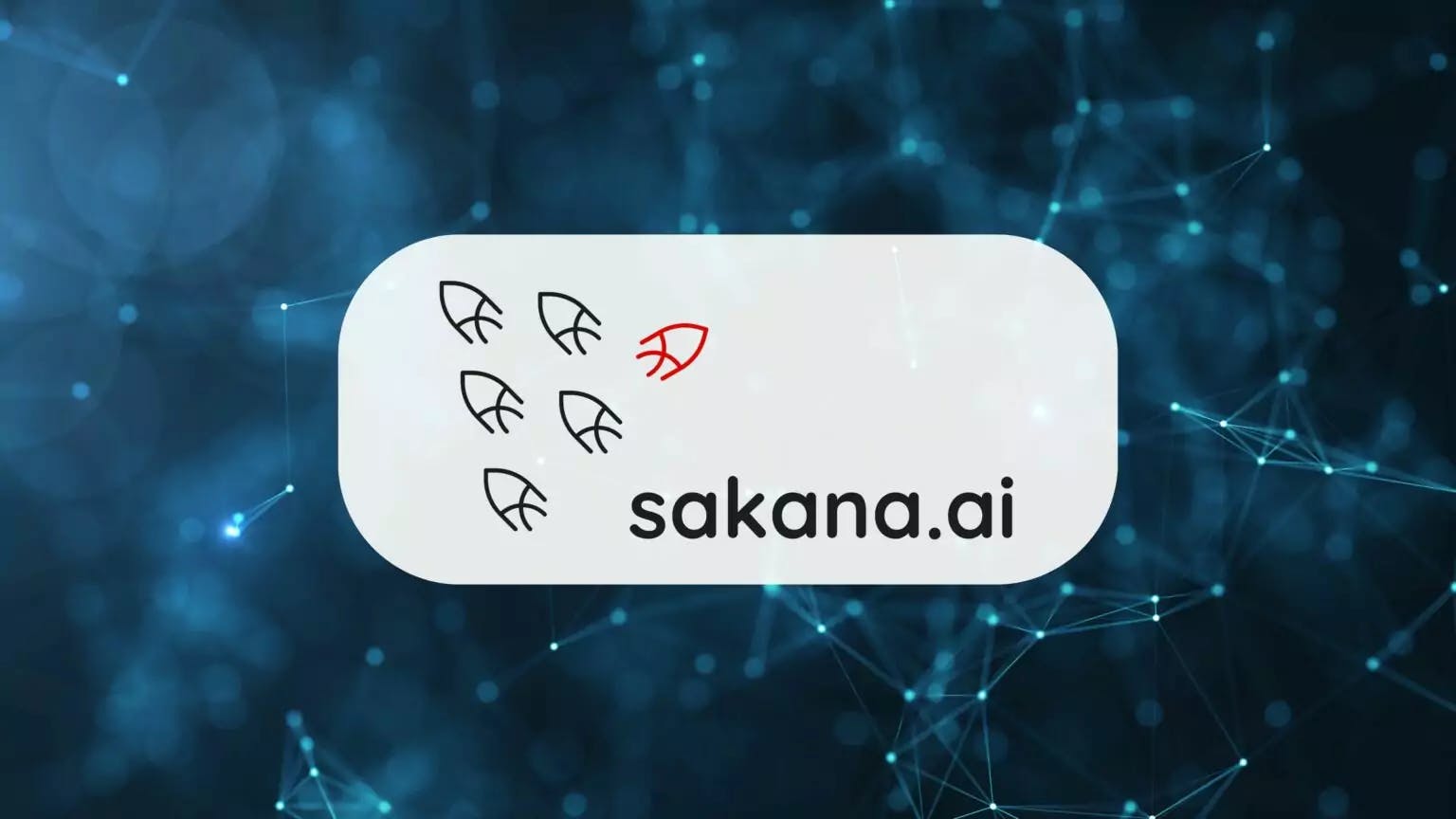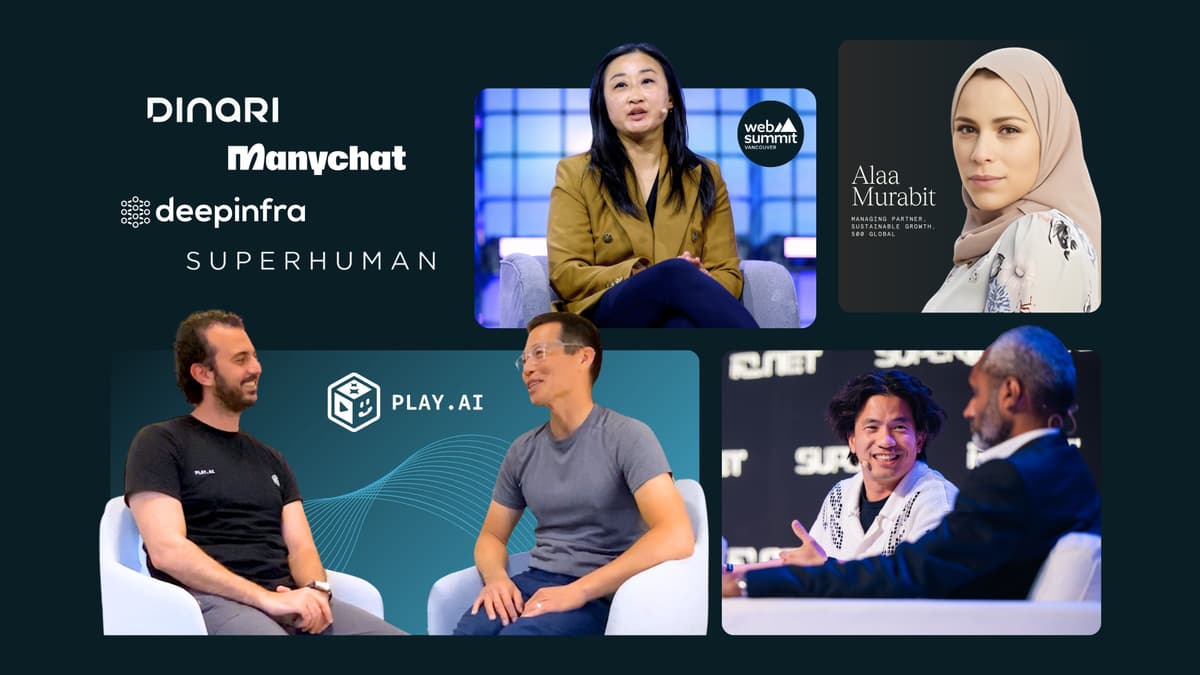2024.01.31

500 Global Team

I am thrilled to announce 500 Global’s latest investment in Sakana AI, a world-class AI research lab at the forefront of AI innovation. Founders David Ha and Llion Jones are pushing the bounds of AI research by exploring alternative approaches to foundation models that are more adaptive and resilient. Even prior to funding, Sakana captured global attention as you can read here and here from CNBC and VentureBeat respectively. We are honored to invest alongside other US investors Lux Capital and Khosla Ventures and prominent angels in the AI space including Jeff Dean (Google), Clement Delangue (Hugging Face), and Alexandr Wang (Scale AI).
You can hear directly from Sakana, but I wanted to share 500 Global’s perspective and why we're so excited to be investing in their ambitious vision.
Founders
As with all of our investments, the strength of the founders is at the core of our investment rationale. I first came across David from his (formerly) anonymous blog blog.otoro.net where he was writing about his projects, some of which went viral on Hacker News. Interestingly the blog also caught the attention of Google Brain where David ended up as a research scientist and authored several pioneering papers in deep learning. David ended up leading the Google Brain team in Tokyo before becoming the Head of Research at Stability AI where he led the development of the next-generation versions of Stable Diffusion and other initiatives.

Sakana AI co-founder David Ha discussing potential company ideas with 500 Global Managing Partner Tony Wang in Tokyo, Japan. Credit: Tony Wang
Llion Jones is no stranger to both AI industry practitioners and watchers as he was one of the authors of the seminal 2017 Transformer paper that has paved the way for the current wave of generative AI innovation. Over his 12-year career at Google, Llion played a major role in the development of using pre-training for language models as well as helped solve many challenging natural language and translation problems. Another fun fact is that Llion is the person who came up with the now-famous title, Attention is All You Need, as a nod to his British roots with the Beatles. I was lucky enough to catch up with him on his last day at Google [pictured] and welcome him to be a fellow Xoogler.

Sakana AI co-founder Llion Jones on his final day at the Google Japan office in Shibuya Credit: Tony Wang
The talent that David and Llion have assembled so far in Sakana has been staggering. Sakana COO Ren Ito led the global expansion of Mercari, one of Japan’s early unicorn start-ups, as well as deep expertise in diplomacy as a part of the Japanese Foreign Service. Other founding members include researchers from Google Brain, DeepMind, Stability AI and other AI research institutes.
Pushing AI innovation, especially in areas that are understudied, is not for the faint of heart, as gains are extremely hard to come by. But when it happens, it may create enormous value for partners, users, and society at large. That is why we are excited to be partnering with a team that has a proven track record of doing what is previously unproven.

Each of the authors of the Transformer paper have left Google for AI startups like OpenAI, Cohere, Character AI, Adept, and now Sakana AI.
Global Opportunity
Since its inception, 500 Global has believed that the best founders would come from all corners of the world. The first stage of our global thesis came in the form of talented founders moving to the US to build their startups, as exemplified by our early investment into companies like Talkdesk with strong immigrant founders. The next stage was seeing founders establish regional or global unicorns from their home base. That belief formed the basis for 500’s investments in startups like Canva, Intercom and Grab. Our investment in Sakana AI epitomizes the next step in the evolution of global founders: the strongest founders will attract the best talent from anywhere in the world.

The CEOs of Canva, Grab and Talkdesk, Melanie Perkins, Anthont Tan and Tiago Paiva.
Additionally, we have been following global markets for over a decade, and believe that Japan is experiencing a confluence of factors that are more encouraging for startups relative to the past. We have witnessed how multiple startup hubs have recently emerged across Japan through public-private initiatives. In fact, we have first-hand been involved with providing input and building the startup ecosystem with programs like Accelerate Aichi by 500 Global. Additionally, the Japanese government has recently emphasized its commitment to the importance of fostering the growth of more unicorns in Japan through its 5-year plan. Indeed, our early investments into Japanese startups such as Paidy, Whill and SmartHR, we believe are examples of this growing trend.
Specifically on AI, Japan has had a deep history with AI research, and I believe that Sakana represents the natural extension of the next phase of AI innovation. While starting in the 1950s at the dawn of the modern AI era, Japan accelerated its support of AI research in the early 1980s with deep collaboration among academia, the private sector, and government support. Researchers in Japan were exploring massively parallel computing for more than a decade before NVIDIA found a commercial market by rendering graphics for PC games. Japan’s expertise in electronics and robotics, along with its current focus on developing healthcare AI, autonomous vehicles, and smart cities, offers an extremely attractive environment for state-of-the-art AI solutions developed domestically.
The AI Platform Shift
500’s global perspective allows us to identify key opportunities before they become obvious, giving us a unique advantage for our investors. Our investment in Credit Karma, one of the largest fintech exits at $8.1B, occurred long before the term “fintech” even became a category. As another example, we supported Twilio (NYSE:TWLO) before data infrastructure and SaaS became a sector in which entire funds are now dedicated to investing.
No one at this point believes that AI is an undiscovered opportunity. Many tech observers have already commented on how AI represents the next “platform shift,” but few have actually defined what that means. I discussed in this three-part series the following question: Has AI Become the New Tech Platform? In it, I discuss how the current era of generative AI fits into the overall innovation cycle, how it compares to previous technology shifts, and what opportunities it presents to founders and investors. And the conclusion I reach is the following: it is still early and the AI wave is still on its way.
Sakana embodies the next stage of generative AI development. While current generative AI models have been indeed impressive, there is still plenty of room for growth. Models built on the transformer architecture face limits around resources needed for training, are static and unable to self-adapt, and are prone to attack or failure. For example, adaptive designs due to self-organization can overcome some of the limits, and combining evolutionary computing approaches with deep learning could yield further breakthroughs necessary for efficient, adaptive, and resilient models.
Diversity Spurs Innovation
Investing globally from day one at 500 has allowed us to identify opportunities to drive innovation due to differences in markets. We fund and support startups because we believe the world will be better with a diverse range of attempts to solve a variety of problems. Not only does that benefit us financially, but diversity has been critical to driving further innovation.
We believe that Sakana is well-positioned to deliver the promise of AI to the next generation of users. As AI becomes a critical part of every organization’s supply chain, it will be increasingly clear that the world’s needs will not be met solely by a select few companies on the West Coast of the US. Instead, the opportunity in this current phase of AI development is to create many approaches that can solve hard problems from different perspectives.
This investment in Sakana AI is more than a financial commitment. It’s an affirmation of our long-held belief in the power of diverse, global perspectives to drive innovation.
We are excited to be part of Sakana AI’s journey and grateful for the opportunity to support them as they continue to break new ground and redefine what is possible with AI. Together, we look forward to a future shaped by groundbreaking ideas and a global community of innovators.



